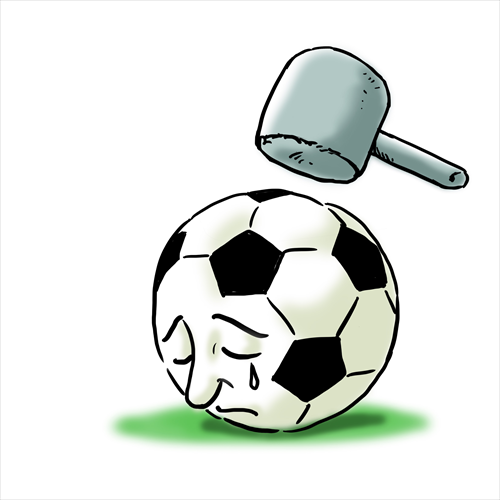Germans still cautious about flag-waving

Illustration: Liu Rui/GT
Argentinians have their Albiceleste, Americans their Stars and Stripes, and the British their Union Jack. Germany's national flag doesn't have a catchy nickname. In the country of its origin, the German flag is perhaps best known as the Schwarz-Rot-Gold, a somewhat bulky term pragmatically describing its three colors: black, red and gold.
On most days, Germans are rather unenthusiastic about the symbol of their state. The Schwarz-Rot-Gold hardly features in everyday life, not in schools, not in front of private homes or even major public buildings. I can only remember seeing the flag consistently in one place in Berlin, where I've lived most of my life: on top of the Reichstag building, the seat of the German parliament.
This changes during the World Cup. Every time Germany competes, the Schwarz-Rot-Gold pops up out of nowhere. One must assume people all over the country store their flags for this particular occasion. Suddenly you see a flagpole flying the national colors in every other garden, balconies festooned with Germany ribbons and wind wheels, and cars with their side mirrors or tank lids clad in the Schwarz-Rot-Gold.
The conspicuous lack of Germany's national colors in everyday life, and, on the other hand, its ubiquity during the World Cup, may easily lead people to believe that soccer does something special for the German national identity. Wolfgang Niersbach, president of the German Soccer Federation (DFB) is one of those people.
According to Niersbach, nothing in Germany creates a greater feeling of togetherness than soccer. He was exhilarated when he stated this in an interview on July 15, minutes before the national team celebrated their victory with half a million fans in front of the Brandenburg Gate.
No one knew the party that followed was going to be one of the most controversial moments in Germany's sport history.
A group of six players clearly had decided to celebrate victory by pulling their opponents' leg. The result of their creativity was the "Gaucho-dance": Led by veteran striker Miroslav Klose and soccer idol Mario Götze, the players crouched forward with heads bowed while chanting "this is how the Gauchos walk," referring to the defeated Argentinians, before switching to joyous jumping and shouting "this is how the Germans walk." Klose and Götze succeeded in animating the crowd.
Before the end of the day, every major newspaper in Germany ran a story about this peculiar way of celebrating. Most of them labelled the performance as "embarrassing," "tasteless," "inappropriate" or even "disgraceful."
A fair portion of the German public did not share this view. On social media, the reports were countered with furious responses: Why did the journalists have to ruin this moment of happiness? Why did the papers prefer to dissect the silliness of a few players rather than savor the glory of Rio?
Some argued that the critics should get their feet back on the ground, since this kind of teasing was common and widespread among professional athletes.
One might expect an angry backlash from the country that had been targeted, but in fact the debate only spiraled out domestically.
Germany's past forbids anything that could be interpreted as a public display of German superiority. Restraint in matters of national pride is engrained in the German educational system and commonly found in many German people.
The country deals with this part of its history in a commendable way: Through its principle of not forgetting its past atrocities and acknowledgement of guilt, Germany preempts the rise of overly nationalistic sentiments and practices collective remembrance as a warning for future generations. So it was natural for the papers to self-flagellate after this performance.
It is revealing to watch the reactions of the people to the "Gaucho-dance" and its chiefly negative reception in the media. It is by now clear that many a German doesn't wish to mix politics and history with the great sports event that captivates the country like no other.
Perhaps it does not matter so much if the much debated performance at Brandenburg Gate should be interpreted as a display of obnoxious gloating or a silly prank. The most important lesson to take away from this is that Germans have a healthy tendency to argue about appropriate ways to express nationalism, and that these arguments are fought out in public.
Whereas a good proportion of the younger generation sees nothing wrong with the "Gaucho-dance," there are still many people in the country who do take offence at such a scene, even if they're not as visible on social media.
The World Cup may be a much longed-for achievement, but it does not have the capacity to boost nationalism as a whole. And before long, the Schwarz-Rot-Gold will once again be a rare sight in German streets.
The author was born and raised in Berlin and is currently completing a master's degree in Asia-Pacific studies at the Australian National University in Canberra. opinion@globaltimes.com.cn